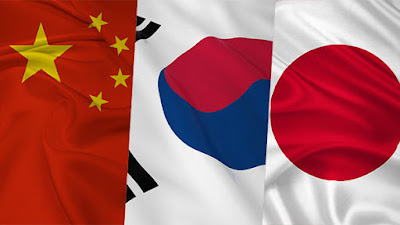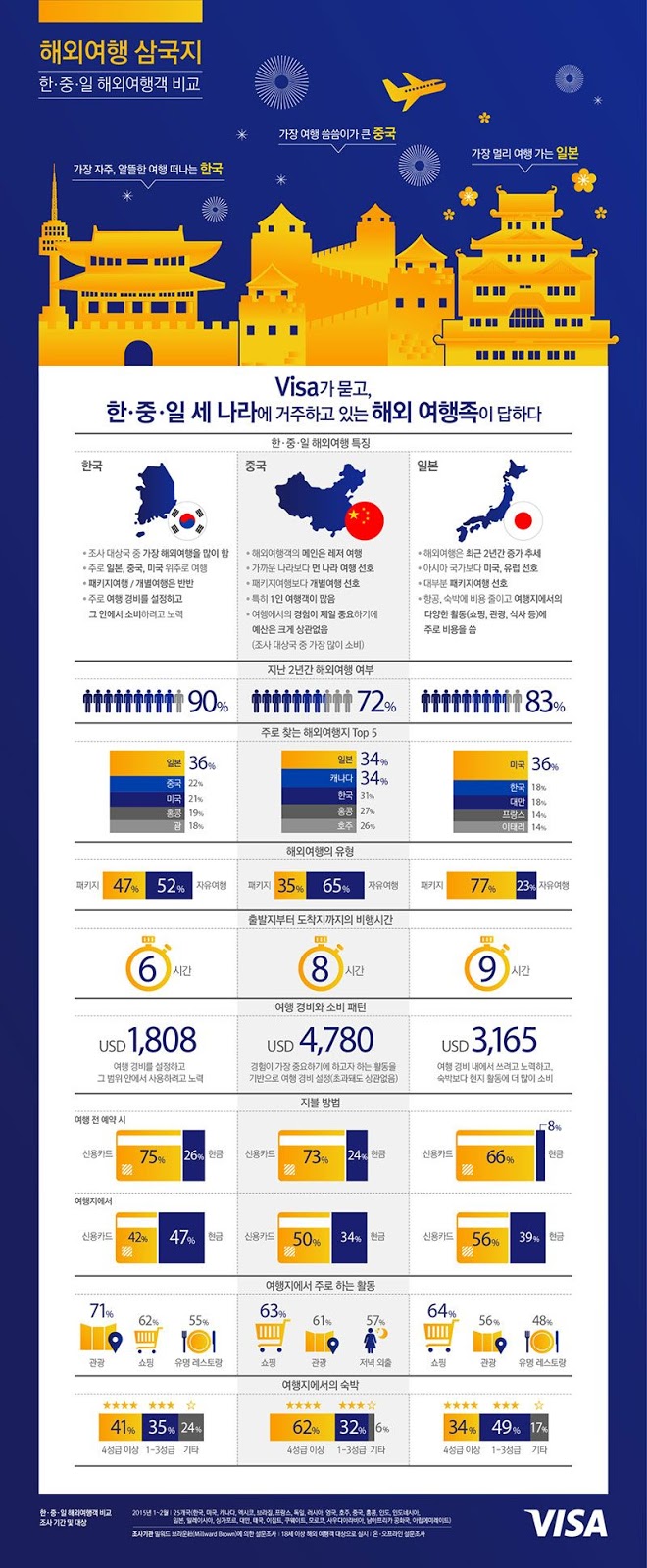전 세계 25개국 1만3,503명의 해외 여행객들을 대상으로 조사한 설문 조사에서, 한국인 해외
여행객 응답자의 90%가 지난 2년 사이에 해외 여행을 한 경험이 있다고 답했습니다. 이는 일본, 중국과 비교해 높은 수치입니다. 한국인 여행객들은 여행을 떠나기 전 전체 여행 경비를 먼저 설정하고 그 안에서 최대한 소비하려고 하는 실용주의적 경향이 강하다고 합니다. 반면, 중국인 해외 여행객들은 하고자 하는 활동들을 먼저 결정하고 그에 필요한 여행 비용을 나중에 산출한다고 답했습니다. 또한 중국인 해외 여행객들은 여행 경비로 전 세계 평균의 두 배가 넘는 4,789달러를 지출해 가장 씀씀이가 큰 것으로 나타났습니다. 일본인 해외 여행객들은 장거리 여행을 더 선호하는 것으로 나타났습니다. 이들은 미국을 가장 많이 방문한 것으로 조사됐으나 평균 여행 경비는 3,165달러로 오히려 중국인들보다 낮았습니다.

In a survey conducted on 13,503 people from 25 countries travelling abroad, 90% of Korean respondents travelling abroad answered that they had gone on an overseas trip within the past 2 years. This is a high figure compared to Japan and China. Korean travellers are said to have a pragmatic trend and try to set the total travel cost first before they leave and do their best to spend money within that amount. On the other hand, Chinese people travelling abroad answered that they decided on the activities they wanted to do first, and then calculated the necessary travel cost later. Also Chinese people travelling abroad turned out to be the biggest spenders, spending 4,789 dollars as their travel expenses, which is more than double the world average. Japanese people travelling abroad turned out to prefer long-distance trips. They were surveyed to have visited the USA the most, but their average travel expense was actually lower than Chinese people at 3,165 dollars.
Audio:
Study Notes
한중일 해외 여행객들의 특징
= Characteristics of Korean, Chinese and Japanese people traveling abroad
•한중일 Korea, China, and Japan
•해외 overseas
•여행객 traveller, tourist
•특징 characteristic, trait
전 세계 25개국 1만3,503명의 해외 여행객들을 대상으로 조사한 설문 조사에서, 한국인 해외
여행객 응답자의 90%가 지난 2년 사이에 해외 여행을 한 경험이 있다고 답했습니다.
= In a survey conducted on 13,503 people from 25 countries travelling abroad, 90% of Korean respondents travelling abroad answered that they had gone on an overseas trip within the past 2 years.
•대상 target
•조사하다 to investigate
•설문 조사 survey
•응답자 respondent
•사이 between
•경험 experience
•답하다 to respond, to answer
이는 일본, 중국과 비교해 높은 수치입니다.
= This is a high figure compared to Japan and China.
높다 to be high
수치 number, figure
한국인 여행객들은 여행을 떠나기 전 전체 여행 경비를 먼저 설정하고 그 안에서 최대한 소비하려고 하는 실용주의적 경향이 강하다고 합니다.
= Korean travellers are said to have a pragmatic trend and try to set the total travel cost first before they leave and do their best to spend money within that amount.
•전체 whole
•경비 expense
•설정하다 to set
•최대한 maximum
•소비하다 to spend, to consume
•실용주의적 pragmatic
•경향 trend, tendency
•강하다 to be strong
반면, 중국인 해외 여행객들은 하고자 하는 활동들을 먼저 결정하고 그에 필요한 여행 비용을 나중에 산출한다고 답했습니다.
= On the other hand, Chinese people travelling abroad answered that they decided on the activities they wanted to do first, and then calculated the necessary travel cost later.
•먼저 first
•결정하다 to decide
•필요하다 to need
•산출하다 to estimate
또한 중국인 해외 여행객들은 여행 경비로 전 세계 평균의 두 배가 넘는 4,789달러를 지출해 가
장 씀씀이가 큰 것으로 나타났습니다.
= Also Chinese people travelling abroad turned out to be the biggest spenders, spending 4,789 dollars as their travel expenses, which is more than double the world average.
•평균 average
•두배 two times
•지출하다 to spend (money)
•씀씀이 one’s expenditure habit
일본인 해외 여행객들은 장거리 여행을 더 선호하는 것으로 나타났습니다.
= Japanese people travelling abroad turned out to prefer long-distance trips.
•장거리 long distance
•선호하다 to pretend
•나타나다 to appear
이들은 미국을 가장 많이 방문한 것으로 조사됐으나 평균 여행 경비는 3,165달러로 오히려 중국인들보다 낮았습니다.
= They were surveyed to have visited the USA the most, but their average travel expense was actually lower than Chinese people at 3,165 dollars.
•방문하다 to visit
•오히려 rather
